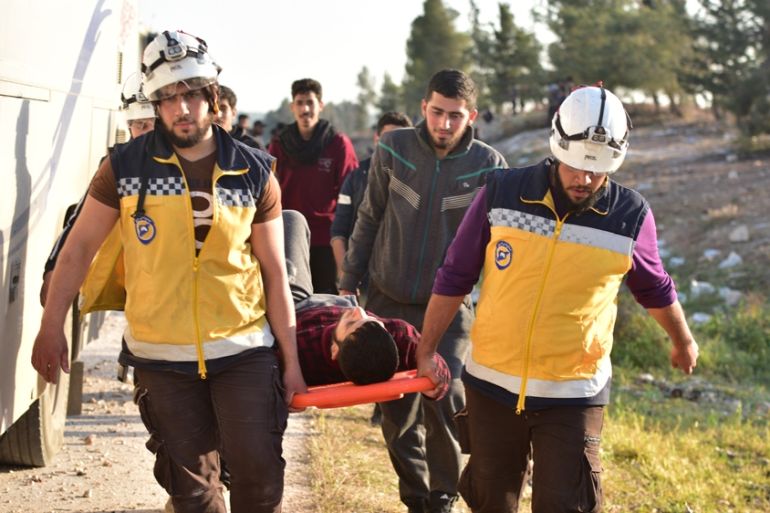After Eastern Ghouta siege ends, healthcare is in short supply

As the buses with people who were forced from their homes left parts of Eastern Ghouta, government forces and allied militia moved in after five years of siege and bombings.
Pro-Assad government television crews rushed in to show how the enclave had been run by rebel fighters, who they call “terrorists”.
Keep reading
list of 4 itemsSouth Africa’s Ramaphosa signs health bill weeks before election
Gaza lost much more than a hospital when it lost al-Shifa
With measles on the rise, rebuilding trust in vaccines is a must
Relentless bombardment had forced people underground into basements. Aid workers say people often spent days in poor living conditions in Eastern Ghouta.
Many were unable to leave, fearing shelling and bombing.
Frequent attacks on hospitals meant even medical treatment was being provided below ground level. In the last days of the siege people connected tunnels and shelters to hospitals.
On some days, doctors say, there would be very few people coming to hospitals and clinics. But at night, that number would increase because people felt safer when they thought the jets could not see them moving.
All this increased not just physical health risks but also mental health problems as people stranded underground suffered extremely high levels of stress.
In Eastern Ghouta, the entire population is accused of supporting the opposition. Now that the siege has ended, aid workers are citing previous examples of neglect in Aleppo and Homs after government takeovers there and warn of a looming crisis for the tens of thousands left behind.
War of words
While the narration on Syrian media says only fighters were allowed into hospitals and civilians were prohibited to enter during the siege, charities supporting these health institutions deny those claims.
The Syrian American Medical Society (SAMS) has been criticised by the Syrian government for assisting doctors in providing evidence of previous chemical attacks to international investigators.
Members of SAMS told Al Jazeera their only mission is to assist doctors and hospitals to provide medical assistance where the Syrian government does not.
According to Syrian media, all organisations helping the besieged population of almost 400,000 people were supporting “terrorists”.
Doctors say their oath demands that they treat people who need medical assistance, irrespective of political or ideological affiliations.
And while the government says there was no medicine shortage in besieged Ghouta, medics say the boxes of medical supplies brandished in government propaganda are misleading.
One aid worker told us that if they needed painkillers for trauma victims of the indiscriminate bombardment they could not have provided that from a box of bandages in a warehouse.
“The situation in Ghouta was extremely traumatic, the needs were absolutely unique there was an unseen situation,” said Omar Ahmed Abenza, the Doctors Without Borders head of mission for northwestern Syria.
“The medical colleagues we were supporting in Ghouta were clearly sharing with us not having enough medical supplies.
“There was a very acute medical situation in Ghouta.”
Displaced injured
The influx of tens of thousands to Idlib and Aleppo is making things difficult for already overstretched health infrastructures there.
Doctors at one hospital in Qalaat al Madiq in the Hama governorate said 5,000 people were dropped off on the first day of the evacuation.
Most of the injured were hit by bombings and some had gunshot wounds to be treated in the hospital’s only operation theatre.
In addition to the hundreds of cases with trauma and injuries, they were treating women giving birth and cases of malnutrition.
“The health system in the Idlib governorate is not enough. You don’t have specialists, you don’t have enough supplies in every health facility,” Abenza said.
“Most importantly, these new arrivals don’t understand how it works – the access is an issue.”
Back in Eastern Ghouta, medical workers are calling on UN agencies to use the proximity to the capital Damascus to rebuild and support the devastated health infrastructure.
MSF said the conduct of the war in Syria must abide by international law, assuring access of people to healthcare services along with protection of patients, health workers and health facilities.
The availability of key medicines and medical consumables – precarious at best for the time being – must be unconditionally granted by all parties to the conflict.
But now that the bombs are no longer falling, there is no more media attention for health needs.